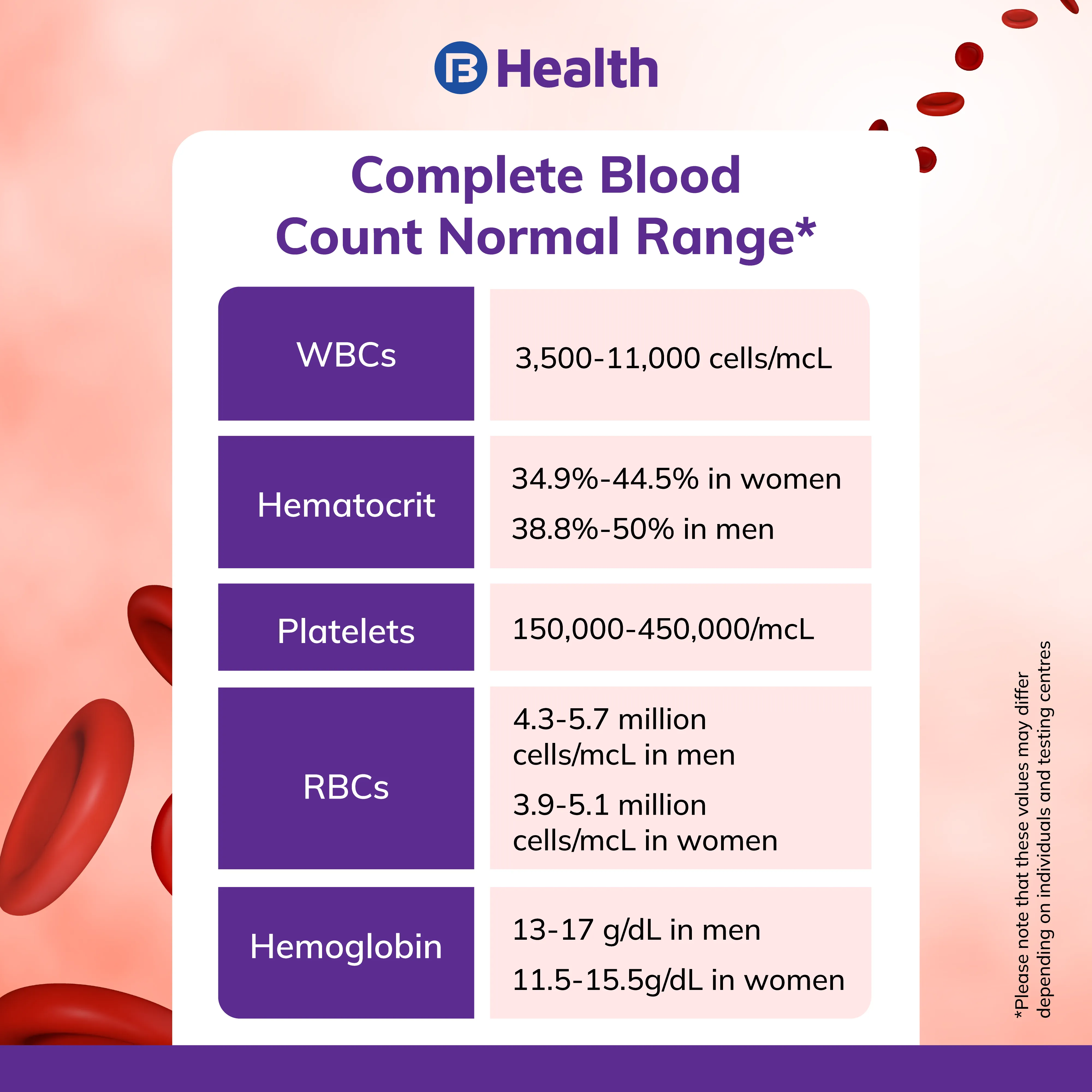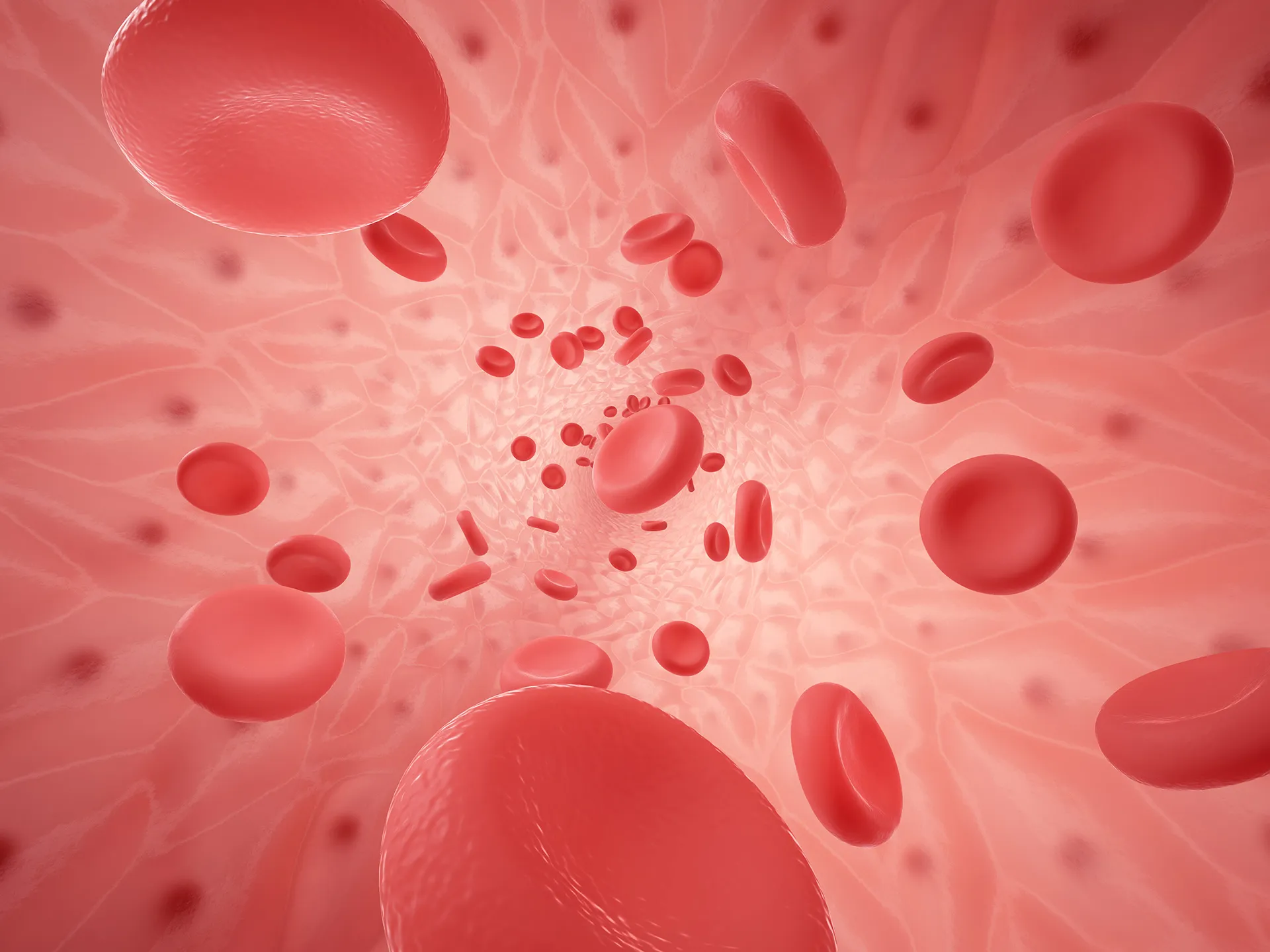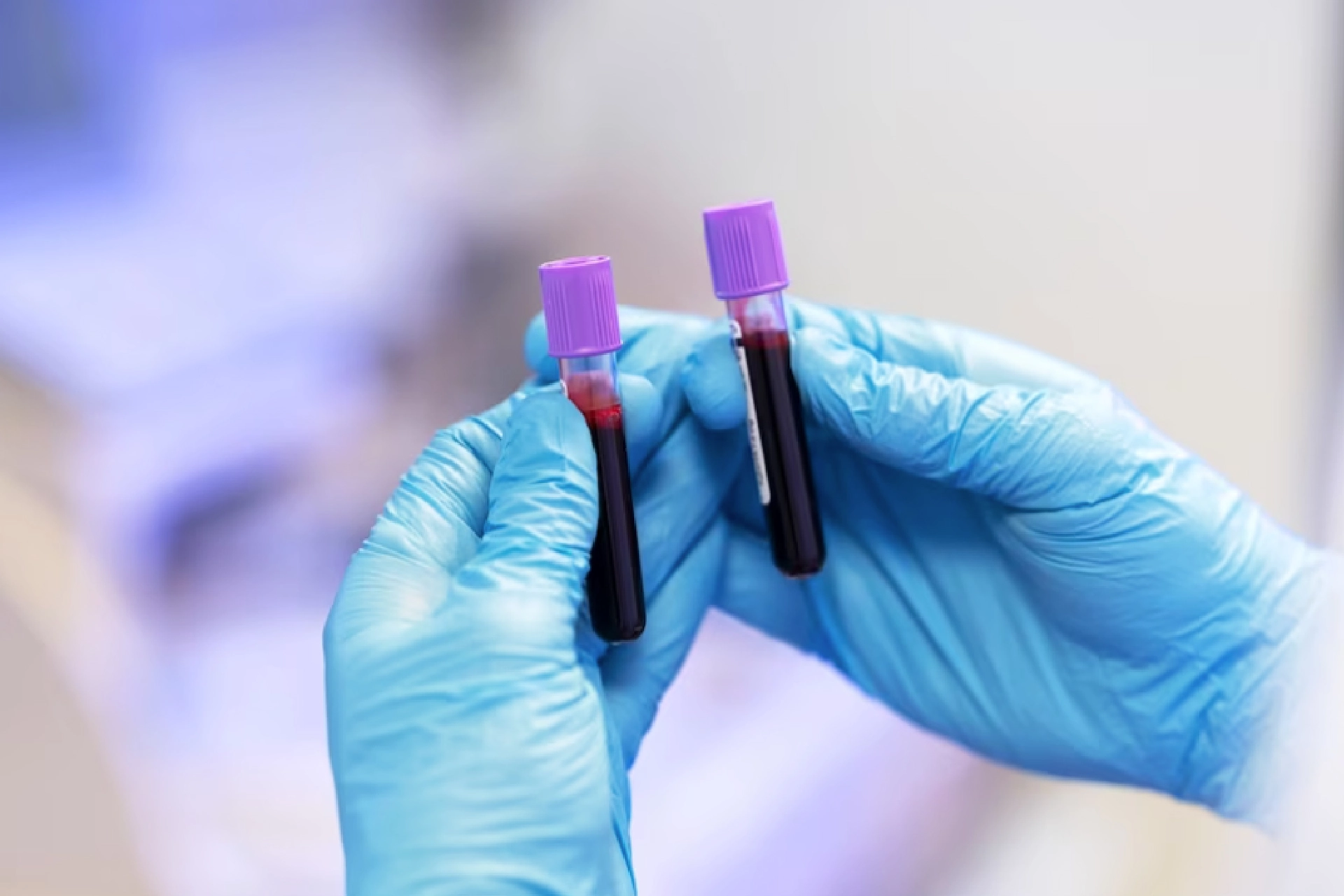Health Tests | 7 min read
Complete Blood Count Test: Normal Ranges, Reports, Preparation
Medically reviewed by
Table of Content
Key Takeaways
- A CBC test measures various components present in your blood
- The CBC test normal range of hemoglobin varies between 11.5–17 g/dL
- You can get your CBC values within 24 hours of sample collection
With a complete blood count or CBC test, you can assess your health conditions and detect infections. This test measures various components present in your blood such as red blood cells (RBC), platelets, white blood cells (WBC), hemoglobin, and hematocrit.
Red blood cells help by transporting oxygen and white blood cells are essential for your body as they fight pathogens. While platelets aid in the blood clotting mechanism, the hemoglobin in red blood cells is the protein that carries oxygen. The hematocrit evaluation determines the number of red blood cells in proportion to the plasma in your blood.
What Is a Complete Blood Count Test?
A complete blood count (CBC) is a blood test used to evaluate your overall health and detect a wide range of disorders, including anemia, infection, and leukemia.[4]
The CBC is one of the most common blood tests performed and is often used as a general indicator of your health. It can also be used to help diagnose and monitor a wide range of conditions, such as anemia, infection, and leukemia.
If there is an abnormal result in your test when compared against the normal CBC values, it may indicate an ailment that requires further evaluation.
Getting a CBC test done is essential for the following reasons:
- To check if you are suffering from any infection
- To monitor a disease
- To assess your overall health parameters
- To track the treatment procedure you are undergoing
Doctors also prescribe this test if you have the following symptoms:
- Pain in joints
- Fever
- Nausea
- Bleeding or bruises
- Weakness
- Dizziness
- Body inflammation
- Increase in blood pressure or heartbeat
CBC Test Normal Range
The CBC can help give your doctor an idea of your overall health and whether or not you have an infection or other condition.[5]
Normal CBC values will vary depending on your age, gender, and race. However, in general, a normal CBC will have the following values:
- Red blood cells: 4.5-5.5 million/microliter
- White blood cells: 4,000-10,000/microliter
- Platelets: 150,000-400,000/microliter
If your CBC values are outside the normal range, it does not necessarily mean you are sick. However, it is something that your doctor will want to investigate further.

What Does a CBC Measure?
A CBC (complete blood count) is a blood test that provides information about the different types of cells in your blood, as well as the level of hemoglobin, or oxygen-carrying protein, in your red blood cells. [5]
The CBC is often used as a routine screening test to check your overall health. It can also be used to help diagnose conditions such as anemia, infection, and leukemia.
Here's a closer look at what the CBC can measure:
Red blood cells:
The CBC can measure the number and size of your red blood cells, as well as the level of hemoglobin. Hemoglobin is the protein that carries oxygen to your cells.
White blood cells:
The CBC can measure the number of white blood cells in your blood. White blood cells are part of your immune system and help fight off infection.
Platelets:
The CBC can measure the number of platelets in your blood. Platelets are cells that help with blood clotting.
CBC test:
The CBC is generally a quick and painless test. A small amount of blood is drawn from a vein in your arm and sent to a laboratory for analysis. The results of your CBC can provide valuable information about your overall health and help to diagnose conditions such as anemia, infection, and leukemia.
Read on to understand more about this test and normal CBC values present in a healthy individual.
Additional read: Blood Group Test
CBC Test Procedure
For a complete blood count test, there is no need to fast. You can drink and eat as usual before going for the test. Your blood sample is taken after inserting the needle in your vein and then is sent for analysis to the laboratory. It is normal to feel soreness in your arm from where the blood has been extracted. In some cases, you may feel slightly dizzy after a CBC test. With the help of this blood sample, a wide range of health ailments can be detected. This helps in early diagnosis and ensures that proper medical treatment is provided on time.
Remember, to compute different kinds of WBCs, doctors recommend CBC test with differential. A CBC test without differential includes only the total count of WBCs.
What Happens During a CBC Test?
The CBC is usually done as part of a routine physical exam, but it can also be used to screen for various medical conditions.[6]
The test measures the following:
Red blood cells:
These cells carry oxygen from the lungs to the rest of the body. A low red blood cell count (anemia) can be caused by bleeding, iron deficiency, or certain diseases.
White blood cells:
These cells fight infection. A high white blood cell count may be a sign of infection, inflammation, or leukemia.
Hemoglobin and hematocrit:
Hemoglobin is the iron-containing protein in red blood cells that carries oxygen to the body's tissues. Hematocrit is the percentage of red blood cells in the blood. Low hemoglobin or hematocrit may be a sign of anemia.
Platelets:
These cells help the blood clot. A low platelet count can be a sign of certain blood disorders, such as leukemia or aplastic anemia.
The CBC is usually done with a blood sample taken from a vein in your arm, but it can also be done with a finger prick or from a blood spot on a filter paper.
The test is usually quick and painless, and the results are usually available within a few days.

What are the Different Conditions Detected by a CBC?
Here are the different types of health conditions that can be determined by a CBC.
- Deficiency of minerals and vitamins
- Disorders affecting bone marrow
- Anemia
- Infections causing a decrease or increase in WBCs
- Cancers like lymphoma or leukemia
- Allergies due to medicines
Easy Interpretation of CBC Values
You can get the test results within 24 hours of sample collection. However, if the value exceeds the CBC test normal range, your doctor may order additional tests. The CBC normal range is actually a reference range mentioned in your report. Any value that exceeds this reference range is considered abnormal and requires medical intervention.
CBC values differ for men and women. When it comes to WBC normal range, females and males should have a count within 3500-10500 cells/mL. The complete blood count normal range of hemoglobin is between 11.5 and 15.5g/dL in women, while the total count normal value in men is between 13-17 g/dL. Refer to a complete blood count normal ranges chart to monitor the result yourself.
What do the CBC Test Reports Indicate?
Your test report will contain two columns that include reference range and your value. If your CBC values fall within reference range, it is considered normal. However, if your results are lower or higher than reference values, it points to something abnormal. If your RBCs, hematocrit and hemoglobin values are low, it may be a hint that you are suffering from anemia. A low WBC count may indicate leukopenia, while a low platelet count means you have thrombocytopenia. If your platelet count is high, it indicates thrombocytosis.
Additional read: Know When Your WBC Count is High or Low?
While a complete blood count test is not a definitive way to diagnose a medical problem, it helps your doctor understand your condition. On the basis of your CBC values, a treatment plan can be devised. If required, you may be asked to undergo certain additional tests as well. Book health tests on Bajaj Finserv Health and monitor your vitals regularly. You don’t have to step out as blood samples are collected right from home! With the provision of online reports, you can access your test results from the convenience of your home. So, get checked on time and address your health issues right away.
References
- https://www.sciencedirect.com/science/article/abs/pii/S1089947203000042
- https://my.clevelandclinic.org/health/diagnostics/4053-complete-blood-count
- https://ashpublications.org/blood/article/103/2/390/17810/Inherited-thrombocytopenia-when-a-low-platelet
- https://my.clevelandclinic.org/health/diagnostics/4053-complete-blood-count
- https://www.webmd.com/a-to-z-guides/complete-blood-count
- https://www.healthline.com/health/cbc#procedure
Disclaimer
Please note that this article is solely meant for informational purposes and Bajaj Finserv Health Limited (“BFHL”) does not shoulder any responsibility of the views/advice/information expressed/given by the writer/reviewer/originator. This article should not be considered as a substitute for any medical advice, diagnosis or treatment. Always consult with your trusted physician/qualified healthcare professional to evaluate your medical condition. The above article has been reviewed by a qualified doctor and BFHL is not responsible for any damages for any information or services provided by any third party.





